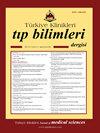Compliance with General Rules and Periodically Differences During the COVID-19 Pandemic in Türkiye: A Cross-Sectional Study
Q4 Medicine
引用次数: 0
Abstract
Objective: The aim of this research is to investigate the compliance of the society with the general 14 rules of the Ministry of Health and the generally accepted hygiene rules recommended in the literature during the coronavirus disease-2019 (COVID-19) pandemic process. In line with the purpose, behavioral differences related to demographic characteristics and pandemic periods were also evaluated. Material and Methods: The study was conducted in August 2021 and snowball sampling technique was used. A questionnaire of 23 questions was applied to participants, in which compliance with the hygiene rules, including demographic questions, was investigated. The study included 1,069 participants between the ages of 18 and 65, living in Türkiye, using smartphones. Results: In our study, when the results of the compliance with the measures are examined, the compliance has decreased in almost all the other periods compared to the first period of the pandemic. In general, females pay more attention to complying with hygiene rules than males. It has been observed that those who have had COVID-19 disease pay less attention to participating in public areas than those who have not had COVID-19 disease. Conclusion: Social distancing, avoidance of mass events, hygiene, etc., are the most criti-cal measures in slowing the spread of coronavirus. For this reason, it should not be forgotten that non-compliance with the rules will lead to an increase in cases. In terms of the “normalization” steps taken during the pandemic process, analyzing the compliance rate with the hygiene rules seems very important in guiding future studies. © 2022, Turkiye Klinikleri. All rights reserved.2019冠状病毒病大流行期间的一般规则遵守情况和周期性差异:一项横断面研究
目的:本研究旨在调查在2019冠状病毒病(COVID-19)大流行过程中,社会对卫生部通用14条规则和文献中推荐的公认卫生规则的遵守情况。根据目的,还评估了与人口特征和大流行时期有关的行为差异。材料与方法:本研究于2021年8月进行,采用滚雪球取样技术。对参与者进行了23个问题的问卷调查,调查了卫生规则的遵守情况,包括人口统计问题。这项研究包括1069名年龄在18岁到65岁之间的参与者,他们住在日本,使用智能手机。结果:在我们的研究中,当检查遵守措施的结果时,与大流行的第一个时期相比,几乎所有其他时期的遵守情况都有所下降。一般来说,女性比男性更注重遵守卫生规则。据观察,与未感染新冠病毒的人相比,感染新冠病毒的人更不注意参与公共场所。结论:保持社交距离、避免群体活动、注意卫生等是减缓新冠病毒传播的最关键措施。因此,不应忘记,不遵守规则将导致案件增加。就大流行过程中采取的“正常化”步骤而言,分析卫生规则的遵守率对于指导未来的研究似乎非常重要。©2022,Turkiye Klinikleri。版权所有。
本文章由计算机程序翻译,如有差异,请以英文原文为准。
求助全文
约1分钟内获得全文
求助全文

 求助内容:
求助内容: 应助结果提醒方式:
应助结果提醒方式:


